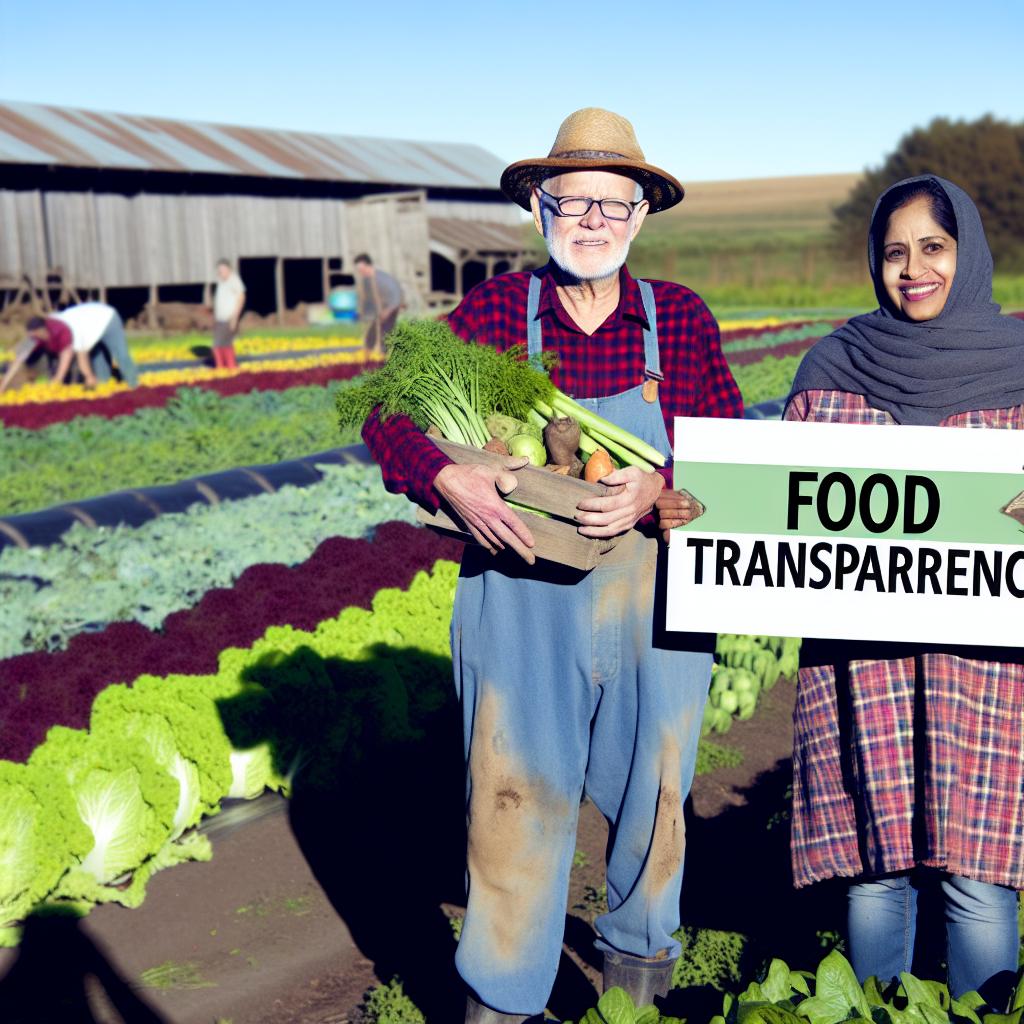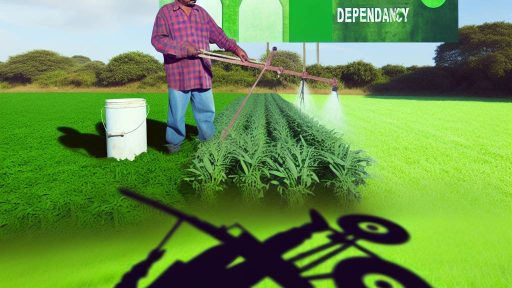Introduction to Organic Farming and Food Transparency
Organic farming emphasizes sustainable agricultural practices.
It avoids synthetic chemicals and genetically modified organisms.
This method focuses on enhancing soil health and biodiversity.
Food transparency has become increasingly important for consumers.
People want to know how their food is grown and processed.
Transparency builds trust between consumers and producers.
Many consumers prefer organic products due to their perceived safety.
They often seek information about the origin of these products.
Consequently, organic farming aligns with these transparency demands.
This connection fosters informed purchasing decisions.
It empowers consumers to support sustainable practices.
Moreover, transparency can enhance market opportunities for farmers.
By informing consumers, farmers can differentiate their products.
This practice encourages ethical and responsible consumption.
Ultimately, organic farming contributes to a healthier food system.
Transform Your Agribusiness
Unlock your farm's potential with expert advice tailored to your needs. Get actionable steps that drive real results.
Get StartedThis practice promotes environmental sustainability and consumer health.
The Importance of Transparency in the Food Supply Chain
Building Consumer Trust
Transparency fosters trust between consumers and producers.
When consumers know where their food comes from, they feel more secure.
Trusting brands often see increased loyalty from consumers.
Additionally, transparency can lead to informed purchasing decisions.
Enhancing Food Safety
Food safety is crucial in the supply chain.
Transparent practices allow consumers to trace food origins.
Such traceability helps identify and eliminate sources of contamination.
Therefore, transparency improves overall food safety standards.
Promoting Ethical Practices
Transparency showcases the ethical practices behind food production.
Consumers are increasingly interested in cruelty-free and sustainable options.
Ethical farming practices can directly influence consumer choices.
Consequently, companies are motivated to improve their practices.
Regulatory Compliance and Accountability
Regulations often require transparency in the food industry.
Companies must adhere to labeling and safety guidelines.
This compliance not only protects consumers but also enhances accountability.
Moreover, transparency may lead to better industry practices overall.
Engaging with Local Communities
Transparency enables engagement with local communities.
Farmers can share details about their production methods.
Consumers appreciate knowing how their food supports local economies.
This connection can promote community-driven agricultural practices.
Facilitating Accurate Information Flow
Transparent practices improve the flow of information in the supply chain.
Producers, retailers, and consumers all benefit from accurate data.
This accuracy helps mitigate misinformation about food products.
Showcase Your Farming Business
Publish your professional farming services profile on our blog for a one-time fee of $200 and reach a dedicated audience of farmers and agribusiness owners.
Publish Your ProfileConsequently, the entire food network can operate more efficiently.
How Organic Farming Practices Promote Food Transparency
Commitment to Natural Ingredients
Organic farming emphasizes using natural ingredients in food production.
This commitment fosters trust between consumers and producers.
Consumers can confidently choose organic products without harmful additives.
Clear Labeling Standards
Organic farming regulations require clear and honest labeling.
Labels must indicate the production methods used.
Furthermore, this transparency helps shoppers make informed decisions.
Traceability of Food Sources
Organic farms often implement traceability systems for their products.
These systems allow consumers to track the source of their food.
Consequently, customers can verify the authenticity of organic claims.
Environmental Benefits
Organic farming promotes sustainable practices that benefit the environment.
This approach reduces pollution and conserves water resources.
Moreover, it enhances soil health and biodiversity.
Community Engagement
Many organic farms focus on building relationships with local communities.
This engagement increases awareness about food origins.
Additionally, it connects producers and consumers, fostering accountability.
You Might Also Like: Crop Rotation Strategies That Foster Biodiversity In American Agriculture
Consumer Awareness and Demand for Organic Food Transparency
Growing Consumer Interest
Consumers are increasingly interested in where their food comes from.
This interest stems from a desire for healthier lifestyles.
Furthermore, knowledge about sustainable practices is on the rise.
Organic farming aligns with this growing awareness.
The Role of Transparency
Transparency in food production builds consumer trust.
People want to know the methods behind their food choices.
They seek clarity on ingredients and sourcing practices.
As a result, companies must provide clear information.
Impact on Purchasing Decisions
Transparent practices influence consumer purchasing decisions.
Research indicates transparency leads to higher sales in organic products.
Consumers prefer brands that openly share their practices.
This trend emphasizes the importance of honest labeling.
Certification and Labeling
Certifications play a crucial role in organic food transparency.
Organizations like the USDA ensure compliance with organic standards.
These labels help consumers make informed choices.
Additionally, consumers trust third-party certifications more than brands alone.
The Rise of Digital Transparency
Digital platforms enhance transparency in food sourcing.
Many brands now share detailed product information online.
Consumers appreciate access to farm-to-table information.
This shift supports informed consumer decisions.
Challenges in Achieving Transparency
Despite advancements, challenges remain in achieving transparency.
Some companies still provide vague information about sourcing.
Others may face barriers due to complex supply chains.
Showcase Your Farming Business
Publish your professional farming services profile on our blog for a one-time fee of $200 and reach a dedicated audience of farmers and agribusiness owners.
Publish Your ProfileTransparency thus requires ongoing commitment and efforts.
Discover More: How Traceability Systems Help Farmers Meet Food Safety Standards
The Role of Certifications in Ensuring Organic Standards
Understanding Organic Certifications
Organic certifications validate adherence to specific agricultural practices.
They provide consumers with confidence in organic labeling.
Entities like the USDA establish rigorous standards for organic products.
Therefore, certifications play a crucial role in maintaining integrity.
Types of Certifications
There are several types of certifications in the organic sector.
- The USDA Organic certification is the most recognized in the U.S.
- Other certifications include Oregon Tilth and CCOF.
- Each certification has unique standards and guidelines.
The Impact of Certifications on Consumer Trust
Certifications enhance consumer trust in organic food products.
They assure customers that products meet established organic standards.
As a result, consumers feel more confident in their purchasing decisions.
Indeed, transparency in sourcing builds long-term relationships.
The Certification Process
The certification process involves several key steps.
- Farmers must submit an application detailing their practices.
- An on-site inspection verifies compliance with organic standards.
- Finally, farmers receive certification upon successful completion.
This thorough process ensures only legitimate organic products reach the market.
Challenges in the Certification Landscape
Despite its importance, the certification process faces challenges.
Many small farms struggle to afford the costs associated with certification.
Additionally, the complexity of standards can be overwhelming.
Therefore, efforts are needed to streamline and support the process.
Future Prospects for Organic Certifications
The demand for organic products is growing steadily.
This trend suggests that certifications will continue to evolve.
New technologies may simplify the certification process.
As a result, more farmers could enter the organic market.
Ultimately, better access to certifications will enhance food transparency.
Find Out More: Food Waste Reduction Guidelines for Farm-to-Market Producers

Challenges Facing Organic Farmers in Maintaining Transparency
Understanding the Complexity of Certification
Organic certification involves strict regulations and procedures.
Farmers often struggle to navigate these requirements effectively.
This complexity can lead to misunderstandings among consumers.
Consequently, transparency suffers as consumers seek clarity.
Market Competition and Consumer Expectations
The organic market is increasingly competitive.
Farmers face pressure to differentiate themselves from conventional producers.
Consumers expect high levels of transparency regarding sourcing and practices.
Failing to meet these expectations can impact farmer reputations.
Supply Chain Transparency
Maintaining transparency throughout the supply chain is crucial.
Farmers rely on various suppliers for seeds and fertilizers.
Each supplier must also adhere to organic standards.
Any gaps in transparency along the chain can create mistrust.
Education and Awareness
Many consumers lack knowledge about organic farming practices.
This lack of awareness can lead to skepticism regarding certification.
Educating consumers is vital for building trust.
Workshops and online resources can help improve understanding.
Regulatory Challenges
Organic farmers must comply with local, state, and federal regulations.
Showcase Your Farming Business
Publish your professional farming services profile on our blog for a one-time fee of $200 and reach a dedicated audience of farmers and agribusiness owners.
Publish Your ProfileRegulatory changes can create confusion and require adaptation.
This variability can hinder farmers’ ability to communicate effectively.
Ensuring compliance and maintaining transparency is an ongoing challenge.
Delve into the Subject: How Farm-To-Table Pop-Ups Strengthen Rural Farming Economies Across The USA
Case Studies: Successful Organic Farms and Their Transparency Efforts
Green Acres Farm
Green Acres Farm in Oregon demonstrates exceptional transparency in their practices.
They implement open tours for visitors and customers alike.
This initiative builds trust among consumers.
Moreover, they utilize an online portal to share real-time farm updates.
This portal includes information on crops and soil health.
Consequently, customers feel more connected to the farm.
Sunny Fields Organic Orchard
Sunny Fields Organic Orchard focuses on sustainable fruit production.
The farm actively engages in community outreach efforts.
They offer workshops on organic farming techniques.
In addition, the orchard provides a detailed ingredient list for all products.
This policy enhances consumer confidence in their products.
Harmony Farms
Harmony Farms prides itself on its commitment to transparency.
They produce a monthly report on pesticide usage.
This report is accessible to the public online.
Additionally, they employ social media to share farming news.
This approach fosters a sense of community among their followers.
As a result, Harmony Farms has built a loyal customer base.
Evergreen Homestead
Evergreen Homestead operates under strict organic certification standards.
The farm encourages feedback from customers about their products.
This feedback loop helps improve transparency and quality.
Furthermore, they spotlight local partnerships on their website.
This highlights their commitment to supporting the local economy.
Such practices enhance their credibility and visibility in the market.
The Future of Organic Farming and the Evolution of Food Transparency
Emerging Trends in Organic Farming
Organic farming is evolving due to consumer demand for healthier food.
Farmers are adopting more sustainable practices based on research.
Innovative technologies enhance organic crop yields and sustainability.
Moreover, organic farming fosters a closer relationship with consumers.
Your Right to Know: Food Transparency
Food transparency empowers consumers to make informed choices.
It encompasses labeling, sourcing, and production practices.
Strong demand for transparency drives market changes across industries.
Consumers increasingly seek information about their food origins.
The Intersection of Organic Farming and Transparency
Organic farming inherently promotes transparency in food production.
Certification processes ensure accountability in organic practices.
Furthermore, many organic brands prioritize open communication with customers.
This builds trust and reinforces consumer loyalty over time.
Challenges Ahead for Organic Farmers
Despite progress, organic farmers face unique challenges ahead.
Showcase Your Farming Business
Publish your professional farming services profile on our blog for a one-time fee of $200 and reach a dedicated audience of farmers and agribusiness owners.
Publish Your ProfileMarket fluctuations affect access to organic inputs and resources.
Furthermore, maintaining compliance with organic standards can be costly.
Farmers must adapt to strict regulations while remaining profitable.
The Role of Technology in Enhancing Transparency
Technology can bridge gaps between farmers and consumers.
Blockchain technology offers secure and verifiable food sourcing.
Mobile applications provide real-time tracking of food products.
As a result, transparency increases throughout the supply chain.
Consumer Education and Awareness
Education plays a significant role in promoting food transparency.
Informative campaigns can promote awareness about organic practices.
Engaging resources empower consumers to seek out organic options.
Ultimately, well-informed consumers can drive further demand for transparency.
Additional Resources
The Farm-to-Table Movement — AGRITECTURE
Building Connections with Your Food: Locally Raised Beef & the …




